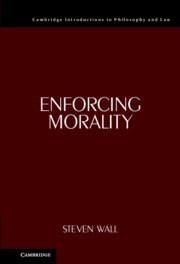86 results
2 - Mill’s Principle
- from Part I - Background Controversies
-
- Book:
- Enforcing Morality
- Published online:
- 03 November 2023
- Print publication:
- 16 November 2023, pp 23-43
-
- Chapter
- Export citation
Contents
-
- Book:
- Enforcing Morality
- Published online:
- 03 November 2023
- Print publication:
- 16 November 2023, pp vii-vii
-
- Chapter
- Export citation
Acknowledgments
-
- Book:
- Enforcing Morality
- Published online:
- 03 November 2023
- Print publication:
- 16 November 2023, pp viii-viii
-
- Chapter
- Export citation
Bibliography
-
- Book:
- Enforcing Morality
- Published online:
- 03 November 2023
- Print publication:
- 16 November 2023, pp 224-230
-
- Chapter
- Export citation
9 - Free Expression
- from Part II - Critical Legal Moralism
-
- Book:
- Enforcing Morality
- Published online:
- 03 November 2023
- Print publication:
- 16 November 2023, pp 168-198
-
- Chapter
- Export citation
8 - Rights to Do Wrongs
- from Part II - Critical Legal Moralism
-
- Book:
- Enforcing Morality
- Published online:
- 03 November 2023
- Print publication:
- 16 November 2023, pp 150-167
-
- Chapter
- Export citation
10 - Pragmatism and the Perils of Enforcement
- from Part II - Critical Legal Moralism
-
- Book:
- Enforcing Morality
- Published online:
- 03 November 2023
- Print publication:
- 16 November 2023, pp 199-223
-
- Chapter
- Export citation
Part II - Critical Legal Moralism
-
- Book:
- Enforcing Morality
- Published online:
- 03 November 2023
- Print publication:
- 16 November 2023, pp 87-223
-
- Chapter
- Export citation
Copyright page
-
- Book:
- Enforcing Morality
- Published online:
- 03 November 2023
- Print publication:
- 16 November 2023, pp vi-vi
-
- Chapter
- Export citation
1 - Introduction
-
- Book:
- Enforcing Morality
- Published online:
- 03 November 2023
- Print publication:
- 16 November 2023, pp 1-20
-
- Chapter
-
- You have access
- HTML
- Export citation
5 - Ethical Environmentalism I
- from Part II - Critical Legal Moralism
-
- Book:
- Enforcing Morality
- Published online:
- 03 November 2023
- Print publication:
- 16 November 2023, pp 89-110
-
- Chapter
- Export citation
6 - Ethical Environmentalism II
- from Part II - Critical Legal Moralism
-
- Book:
- Enforcing Morality
- Published online:
- 03 November 2023
- Print publication:
- 16 November 2023, pp 111-130
-
- Chapter
- Export citation
Part I - Background Controversies
-
- Book:
- Enforcing Morality
- Published online:
- 03 November 2023
- Print publication:
- 16 November 2023, pp 21-86
-
- Chapter
- Export citation
3 - The Hart/Devlin Debate
- from Part I - Background Controversies
-
- Book:
- Enforcing Morality
- Published online:
- 03 November 2023
- Print publication:
- 16 November 2023, pp 44-63
-
- Chapter
- Export citation
Index
-
- Book:
- Enforcing Morality
- Published online:
- 03 November 2023
- Print publication:
- 16 November 2023, pp 231-234
-
- Chapter
- Export citation
4 - Sovereignty and Consent
- from Part I - Background Controversies
-
- Book:
- Enforcing Morality
- Published online:
- 03 November 2023
- Print publication:
- 16 November 2023, pp 64-86
-
- Chapter
- Export citation
7 - The Good of Personal Liberty
- from Part II - Critical Legal Moralism
-
- Book:
- Enforcing Morality
- Published online:
- 03 November 2023
- Print publication:
- 16 November 2023, pp 131-149
-
- Chapter
- Export citation

Enforcing Morality
-
- Published online:
- 03 November 2023
- Print publication:
- 16 November 2023
Chapter 6 - Self-Mastery and the Quality of a Life
-
-
- Book:
- Positive Freedom
- Published online:
- 03 September 2021
- Print publication:
- 16 September 2021, pp 102-119
-
- Chapter
- Export citation
22 - The Experimental Turn in Public Management: How Methodological Preferences Drive Substantive Choices
- from Part IV - Issues and Implications
-
-
- Book:
- Experiments in Public Management Research
- Published online:
- 27 July 2017
- Print publication:
- 13 July 2017, pp 461-475
-
- Chapter
- Export citation



